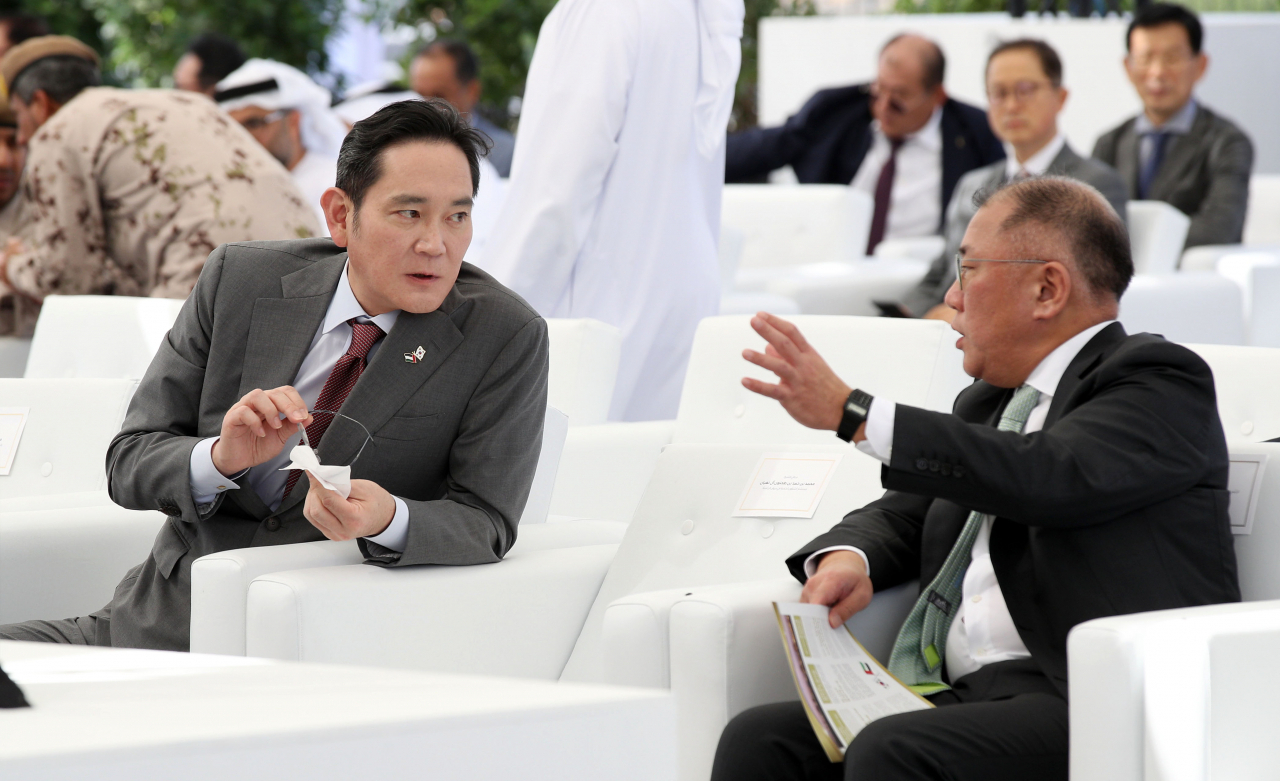
South Korea’s top makers of chips and cars, Samsung Electronics and Hyundai Motor Group, announced their first-ever partnership last week, fueling speculation that their rare tie-up could further extend in the field of future mobility. Under the deal, Samsung will supply automotive chips for Hyundai’s upcoming cars.
Since the late 1990s, when Samsung ditched its car-making business, the nation’s two largest conglomerates have distanced themselves from being involved in direct competition across industries. At the time, Samsung had to leave the market after its failed attempt to acquire then-bankrupt Kia Motors. Meanwhile, Hyundai Motor merged with Kia, paving the way for global expansion based on its dominance at home.
Until recently, a dominant sentiment here was that the two giants would lock horns in the burgeoning future mobility market. But last week’s announcement flouted such expectations, raising hopes instead for further synergy.
Starting with their latest partnership on in-car infotainment systems, industry watchers predict the two crosstown rivals are highly likely to join forces on software-defined vehicles (SDVs), more specifically autonomous driving. The move is seen as the longtime rivals' attempt to gain a competitive edge together in the ever-evolving mobility market.
“It is possible for Hyundai to work with Samsung, which can provide processors that analyze immense data from SDVs, especially self-driving cars,” a source close to the matter told The Korea Herald on condition of anonymity. “Basically, SDVs run on automotive chips, so partnerships between makers of chips and cars are inevitable.”
Hyundai already operates multiple business divisions working on SDVs, including its recent acquisition 42dot, dedicated to developing operating software for future vehicles. Hyundai’s software prowess combined with Samsung’s strength in hardware can create synergy in the future mobility industry, the source said.
The latest development followed Samsung's announcement on Wednesday that it would supply its latest premium automotive processor, called Exynos Auto V920, to Hyundai’s in-car infotainment systems from 2025. The tech giant said that its processors will allow drivers to enjoy high-resolution media content, including high-spec online games.
Both firms declined to further elaborate on the deal, citing confidentiality. Thus far, Hyundai has used chips from foreign partners such as Qualcomm, Nvidia and Infineon Technologies.
“It was the first time that Samsung has announced an official partnership with Hyundai, even though it's had business ties with the carmaker before,” a Samsung official said. According to the official, the chipmaker had previously supplied chips and image sensors to the carmaker, but this was not publicized at the time.
Experts put significant emphasis on their rare public tie-up, as it comes at a time when both Samsung and Hyundai Motor are eager to expand their presence in the global tech race for mobility innovations. In particular, Hyundai seems to be in a rush to secure enough chips under its ambitious goal of replacing all upcoming Hyundai and Kia cars with SDVs by 2025.
Hyundai Motor Group Executive Chair Chung Euisun reaffirmed his commitment to achieving the goal early this year, saying, “Self-driving cars need around 2,000 chips, compared to some 200 to 300 chips for regular cars.”
“Hyundai’s ultimate goal is creating its own operating system for SDVs, rather than relying on existing systems such as Google’s Android Auto that is used by Ford and Stellantis. In its journey to achieve this goal, Samsung can be a stable and long-term business partner,” said Choi Jae-won, a chemistry professor at Gyeongsang National University.
“It is true that Samsung’s automotive chips have not yet gained a firm footing in the market. But that also means Samsung can focus on developing highly-customized chips for Hyundai because other chipmakers receive orders from multiple clients.”
Samsung supplied automotive chips to Audi in 2019, and Volkswagen in 2021.
Partnering with Hyundai, the world’s third-largest carmaker, also offers a boon for Samsung. The top memory chip maker has gone all-out to boost its non-memory chip business -- and automative chips are a major burgeoning sector.
“After acquiring the US-based Harman International in 2016, Samsung has been preparing for its expansion into the lucrative market for SDVs, one of its key growth drivers,” said lee Ho-geun, an automotive engineering professor at Daeduck University. “By securing Hyundai as its key client, Samsung will be able to raise its profile in the global market.”



![[Weekender] How DDP emerged as an icon of Seoul](http://res.heraldm.com/phpwas/restmb_idxmake.php?idx=645&simg=/content/image/2024/04/25/20240425050915_0.jpg&u=)

